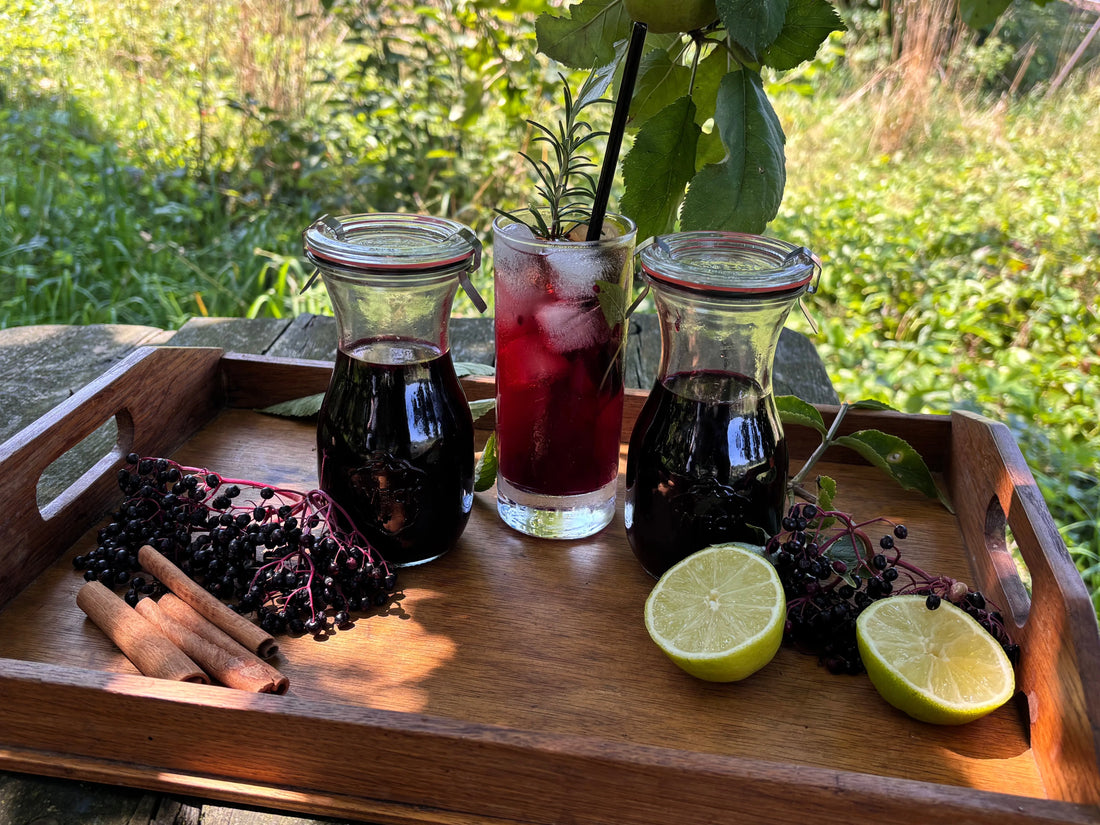
Easy Date Elderberry Syrup for Immune Support
Share
Easy Elderberry Syrup Sweetened with Raw Date Syrup for Holistic Health
Fresh elderberries are bursting with vibrant flavor and have long been valued for their ability to support the immune system and overall wellbeing. Making your own elderberry syrup is a simple, satisfying way to capture their benefits in a delicious, concentrated form you can enjoy throughout the year.
Traditionally, elderberry syrup is made using processed sugar to help preserve it. Many people opt for raw honey instead, for a more natural sweetness. In this recipe, we’re doing things a little differently: we use raw date syrup to sweeten the syrup. It adds a deep caramel note that complements the tartness of the berries beautifully, while keeping things free from refined sugar.
Our raw date syrup is pressed from sun-ripened Mazafati dates and bottled in small batches. It brings a smooth, earthy sweetness to this vibrant syrup, perfect for anyone looking for a gentle yet powerful way to support their body during the colder months or simply add something nourishing to their daily rhythm.
Benefits of Elderberry Syrup for Holistic Health
- Supports the immune system by helping reduce the severity and duration of colds and flu
- Rich in antioxidants that protect cells from oxidative stress
- Contains vitamins A, B, and C for overall vitality and energy
- May reduce inflammation and promote respiratory health
- Natural antiviral properties help the body fight off infections
- Sweetened with raw date syrup, free from refined sugars or additives

Ingredients
- 500 g fresh elderberries, stems removed
- 500 ml water
- 1 cinnamon stick (optional)
- 1 tablespoon freshly grated ginger (optional)
- 120–180 ml raw date syrup (adjust to taste)
- Juice of 1 lemon
Instructions
1. Prepare the elderberries
Rinse the elderberries thoroughly and remove all stems. Stems and unripe berries can be mildly toxic, so make sure only ripe, dark berries are used.
2. Simmer the mixture
Place the berries, water, cinnamon stick, and ginger into a medium saucepan. Bring to a boil, then reduce the heat and simmer uncovered for about an hour, or until the liquid has reduced by about half and the berries are soft and burst.
3. Strain
Remove from heat and let cool slightly. Pour the mixture through a fine mesh strainer or cheesecloth into a clean bowl or large measuring jug. Press the berries with a spoon to extract as much liquid as possible. Compost the solids.
4. Sweeten and finish
While the syrup is still warm (not hot), stir in the raw date syrup and lemon juice until fully combined. It’s important to make sure that the syrup is no longer hot before adding the date syrup to ensure that you don’t lose the benefits of raw date syrup. Taste and adjust the sweetness as needed.
5. Bottle and store
Pour the finished syrup into sterilized glass bottles or jars. Let cool completely before sealing. Store in the refrigerator for 3-4 weeks.

Serving Suggestions
- Take 1-2 tablespoons of elderberry daily, or more often if needed during cold and flu season for general support
- Mix into warm herbal tea or hot water with lemon
- Add a splash to sparkling water or smoothies
- Stir into iced teas for refreshing, immune-boosting support
- Drizzle over porridge, yogurt, or pancakes
Storage Tips
Keep your elderberry syrup refrigerated in a tightly sealed glass container. Always use a clean spoon or pour directly to keep it fresh. Fresh syrup can be stored for about 3-4 weeks in the refrigerator.
You can fill an ice cube tray with your date-elderberry syrup for longer storage and use ~1 cube per serving.
Variations and Tips
- Add whole cloves or star anise while simmering for a spiced twist
- Adjust sweetness based on how tart your elderberries are (some are sharper than others)
- Use a reusable cloth or nut milk bag for easier straining
Using dried or frozen berries
This Date Elderberry Syrup can also be made year-round using dried or frozen berries. Making them in monthly batches during the winter months is a great way to always have fresh date elderberry syrup on-hand without having to compromise by using industrial sugar to preserve them.
For Dried Berries
A good rule of thumb is: 1 part dried elderberries ≈ ~2 parts fresh elderberries.
So, if a recipe calls for 500 g fresh elderberries, you’d use about: 250 g dried elderberries instead. The exact number doesn’t have to be precise, but just in the same ballpark. The water content stays the same as the original recipe.
For Frozen Berries
You can use the same amount as you would with fresh berries, the water content again stays the same as the original recipe.
Side Note: Foraging for Elderberries
If you’re gathering elderberries yourself, be sure you’ve identified the right plant: Sambucus nigra is the variety commonly used for syrups. Never use unripe berries, leaves, or stems, as they contain compounds that can be harmful if consumed raw. Pick only fully ripe, dark berries, and always cook them before use. Foraging can be a lovely way to connect with your environment, but take care to forage responsibly and safely.

We’d love to see your creations! Share your Date Elderberry Syrup with us on Instagram @dattelmond or tag us using #dattelmond.
Date good, all good.




